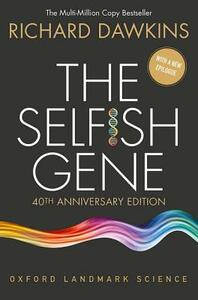Take a photo of a barcode or cover
informative
reflective
slow-paced
I'm DONE! Finally.
2 points I took from this book. One is that Natural Selection is a very complicated topic, and that the Selfish Gene Theory is porbably the best way of thinking about it. Secondly I never want ot be at a dinner party with Richard Dawkins. He is too smart by half, and must be the worst kind of pedant to be stuck in a conversation with.
Gods that was a long slog. A absolutely fascinating one, but I am tired boss.
Dawkins is a difficult man to like, he is very smart, and has made some incredible claims and then meticulously argued each point. So much so that my minds wandered and my ears grew weary, and then he argued some more, and brought up counter arguments I would never have thought of and argued them to death too.
Complaints and my own weakness of mind and lack of patience aside, this was a fascinating book. And it has infected me with it's memes. Watching nature shows this week my mind was constantly spitting out fragments of understanding about how these beings' natural habits evolved to form stable evolutionary stratagems.
I know I will be thinking about this book for a long time to come, but by Jove I'm glad it's done and i don't have to do it again.
2 points I took from this book. One is that Natural Selection is a very complicated topic, and that the Selfish Gene Theory is porbably the best way of thinking about it. Secondly I never want ot be at a dinner party with Richard Dawkins. He is too smart by half, and must be the worst kind of pedant to be stuck in a conversation with.
Gods that was a long slog. A absolutely fascinating one, but I am tired boss.
Dawkins is a difficult man to like, he is very smart, and has made some incredible claims and then meticulously argued each point. So much so that my minds wandered and my ears grew weary, and then he argued some more, and brought up counter arguments I would never have thought of and argued them to death too.
Complaints and my own weakness of mind and lack of patience aside, this was a fascinating book. And it has infected me with it's memes. Watching nature shows this week my mind was constantly spitting out fragments of understanding about how these beings' natural habits evolved to form stable evolutionary stratagems.
I know I will be thinking about this book for a long time to come, but by Jove I'm glad it's done and i don't have to do it again.
The writing style was interesting and accessible but I'm not particularly interested in the topic. I only picked it up because my boss was reading it.
informative
inspiring
informative
slow-paced
Very interesting look at how life began, and why it's taken on the shapes we see around us today. Seems a bit oversimplified though, and it didn't all sit right with me, especially his last chapter on memes.
Nice guys finish first(chapter 12) should be required reading for all.
Nice guys finish first(chapter 12) should be required reading for all.
informative
Imagine being such a terf that you completly get rid of intersex people from your consideration at all. Most of my thought are layed out in this review, https://app.thestorygraph.com/reviews/93afaa9f-016e-4ae2-8433-4a6bacb5a6b7, it's better written then this book and anything else I could say.
Loved it!
Richard Dawkins offers a new perspective on the theory of natural selection. Most of us view the natural selection as individual organisms being evolved with the gene as a token for identity and propagation of the individual. The Selfish Gene, much-criticised mistakenly for its slightly deceptive title, tells us that genes are the real deal. The individual organisms are just "vehicles" for the propagation of the genes. The shocking revelations about the consequences of individual genes trying to succeed in a pool of rival genes (called alleles) can violate human morals. But are genes conscious? Definitely not! So how can we account for their "vicious" or "altruistic" deeds, which are consequences of their "simple" replication, so perfectly? Why do genes exhibit kin selection rather than group selection?
Dawkins answers all these questions (and many more!) brilliantly with the aid of apposite metaphors with startling precision. Furthermore, Dawkins introduces us to "phenotypes"- the bodily manifestation of a gene, it's effects on the body in comparison with its alleles, via development. His central theorem of the extended phenotype in his own words; "An animal's behaviour tends to maximise the survival of the genes 'for' that behaviour, whether or not those genes happen to be in the body of the particular animal performing it" is mindblowing!
Although the view that Dawkins is offering us requires a significant amount of intellectual rigour, 'The selfish gene' is very much accessible, thanks to his literary skills!
Richard Dawkins offers a new perspective on the theory of natural selection. Most of us view the natural selection as individual organisms being evolved with the gene as a token for identity and propagation of the individual. The Selfish Gene, much-criticised mistakenly for its slightly deceptive title, tells us that genes are the real deal. The individual organisms are just "vehicles" for the propagation of the genes. The shocking revelations about the consequences of individual genes trying to succeed in a pool of rival genes (called alleles) can violate human morals. But are genes conscious? Definitely not! So how can we account for their "vicious" or "altruistic" deeds, which are consequences of their "simple" replication, so perfectly? Why do genes exhibit kin selection rather than group selection?
Dawkins answers all these questions (and many more!) brilliantly with the aid of apposite metaphors with startling precision. Furthermore, Dawkins introduces us to "phenotypes"- the bodily manifestation of a gene, it's effects on the body in comparison with its alleles, via development. His central theorem of the extended phenotype in his own words; "An animal's behaviour tends to maximise the survival of the genes 'for' that behaviour, whether or not those genes happen to be in the body of the particular animal performing it" is mindblowing!
Although the view that Dawkins is offering us requires a significant amount of intellectual rigour, 'The selfish gene' is very much accessible, thanks to his literary skills!
informative
reflective
medium-paced



